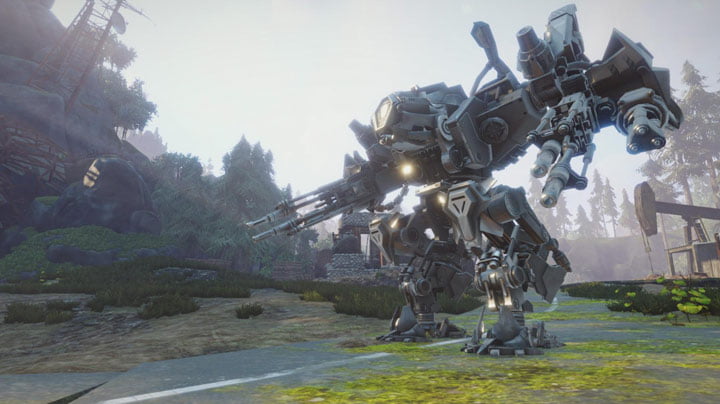Post Skyrim and Witcher, it takes a lot to make an RPG stand out from the crowd. Does Elex have what it takes?
At E3 we met Piranha Bytes, creators of the Gothic and Risen series, who are hoping to make a mark with their new ambitious open-world role-playing game.
At first glance Elex seems to offer little that’s new. A viking-style village? Check. Medieval looking NPCs? Check. Protagonist equipped with a jetpack? Say, what?
And that’s when Elex‘s big selling point becomes clear. Piranha Bytes are creating a world that is a collision of the fantastic and the everyday. A world that combines traditional fantasy and science-fiction. And in this pre-alpha demo, it’s that world – named Magalan – that’s the star.
“We’ve been thinking about the setting for Elex for almost 10 years, and we finally have the chance to implement our ideas. The mix of sci-fi and fantasy offers an incredible number of opportunities and cool contrasts that we can play around with”, says Piranha Bytes’ Björn Pankratz.
The result is a fascinating combination of post-apocalyptic ruin, 70s pulp sci-fi and Tolkein-esque fantasy. An RPG that features mutants, raptor-like dinosaurs and giant mechs in equal measure. A world in which you are just as likely to stumble across a ruined motel as you are a thatched cottage with some soup on the hob.
[youtube url=”https://www.youtube.com/watch?v=AlXZJDVVVxc” autoplay=”no”]Elex is set in the aftermath of a planetary meteor strike. Central to the game is Elex itself, a substance deposited by the strike that is now used by the inhabitants of Magalan in different ways. One of the game’s factions, for example, likes to ingest Elex, another uses it to build high-tech weapons. One group, the Berserkers, process the substance into mana and use it to craft magical weapons. Elex is the narrative conceit behind the game’s mixture of genres.
That mix is also evident in combat. Its based on a standard formula of quick and heavy attacks but by building up a rhythm it’s possible to unleash special moves, delivered with a beautiful flourish, that inflict greater damage on your opponents. Mastering the rhythm is enjoyable but the most promising aspect of combat, however, is the jetpack. It provides a neat way of momentarily escaping a skirmish, allowing you a moment to reposition yourself for a new attack. It adds a satisfying layer to the ebb and flow of melee combat.
During one battle – against a Mass Effect style mech – I was joined by a passing NPC who decided to help me of his own accord. This passing do-gooder delivered the final blow to the mech and then ran off into the distance. As well as being extremely helpful, this random, unscripted event was an example of the emergent gameplay the team are striving to include. This also extend to the game’s creatures. It’s possible, for example, to lure a group of monsters into a village and let them loose on its inhabitants.
Although Elex is being developed by a small team of 30, its scope is large. As well as an expansive open-world, the game also features 300,000 words of dialogue spread over a multitude of quests and side quests. The team at Piranha expects the full experience to clock in at around 60 hours.
It’s too early to know if this cocktail of genres will come together into a coherent final product. Currently the world doesn’t seem quite large enough to accommodate a convincingly seamless transition between different geographies. There are no loading screens but the abrupt changes in environments do jar slightly.
In some respects the collision of styles feels a little incongruous, but, on the other hand, it’s the fact that Elex lets electricity pylons and mechs rub shoulders with dinosaurs and windmills that makes the game notable.
Piranha Bytes are showing plenty of ambition, that’s for sure. Whether they have bitten off more than they can chew remains to be seen, but for such a small team Elex certainly has potential, and is a game to follow.
Elex is being developed for PC, Xbox One and PlayStation 4 and is due for release in Q1 2017.












